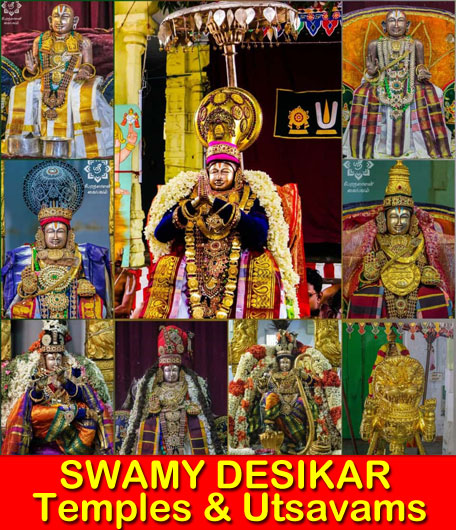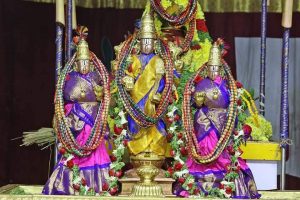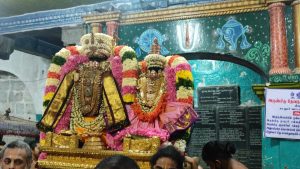Nakulan (a) Dr.Sreeram Jaganathan Setlur
This one is a comparison between noble people and those who are other-wise! The former are compared to parrots and latter to crows! Parrots being choosy in eating, staying etc are found in secluded places. Crows, who are always after eating (enjoyment) can eat anything and subsist anywhere and thus are found everywhere.
सत्सु स्निह्यन्ति सन्तस्तु हरितवनकीरवत् ।
दुर्जना हन्त कुत्रापि भोगनिरतकाकवत् ।। 12 ।।
सत्सु in good things or places स्निह्यन्ति be devoted to or have a liking सन्तः good people
हरितवन green forest कीरवत् like a parrot दुर्जना the bad (or not so good) हन्त alas कुत्रापि
anywhere भोगनिरत after enjoyment काकवत् like a crow
Noble people are attracted to good places and things just like parrots that live in green forests / trees. Others can subsist anywhere as their aim is bhoga or enjoyment of any form, just like crows who eat anything and survive anywhere!
—————-
Technically every living thing is robbing the nature (and fellow robbers) for survival! We are on the extreme right on the scale in terms of capability! In the name of future, we keep accumulating things, with a selfish intention, only to spoil our collective future itself! I am comparing myself with an ant, though much inferior and less capable to me in the act!
सन्तु सर्वेऽपि चोरास्तु मम च ते पिपीलिके ।
चौर्यं दृष्टस्य सर्वस्य कालान्तराय चापि वै ।। 13 ।।
सन्तु let be सर्वेऽपि everyone चोराः robbers तु but मम my च and ते your पिपीलिके ant! चौर्यं robbery दृष्टस्य of what is seen सर्वस्य of all कालान्तराय for future use चापि as well वै indeed.
Hey ant! Everyone is a robber (to survive that moment of hunger atleast). But we two rob everything that we see in the name of future use as well! (Even for the present, no contentment) (we two are perhaps worse than the rest)!
—————-
What is happiness? Well that may be a difficult question. Where do we get happiness from? It could be answered – it depends from person to person or life to life. In a place where we find happiness, someone / something else may not! Those who own pets please excuse!
शय्यान्नं च भवेत् स्थाने याने हि गमनं तथा ।
स्ववृत्तिषु यथा वीथ्यां सुखं नैव गृहे शुनाम् ।। 14 ।।
शय्या bed अन्नं food च and भवेत् be स्थाने in a fixed place याने in a vehicle हि indeed गमनं travel तथा like that स्ववृत्तिषु in own activities यथा like how वीथ्यां in the streets सुखं happiness नैव not at all गृहे in homes (of owners) शुनाम् for dogs!
Let food and bed be available in a fixed place and let them be taken out in a car. The happiness that dogs find in their own ‘activities’ in streets is not found by them in the homes of their owners! Don’t ask me how do I know. Its my ‘intelligent guess’!
—————-
That Yama knows who is going to die is not surprising as he is an expert in that. But an ant, an insignificant being, finds it out! This morning I tried to push away an insect from a window and it fell down. Though I did not intend to kill it, it died. When I went down to see it – no sooner did it die or as it was about to breathe it’s last, there were hundreds of ants around – taking away its LIFE!
जानाति म्रियमानं तु यमो भवतु तत्क्षमः ।
तथा पिपीलिका क्षुद्रा नूनमेतत्तु विस्मयः ।। 15 ।।
जानाति knows म्रियमानं the dying तु but यमः Yama भवतु let it be तत्क्षमः his work / he is an expert तथा also पिपीलिका an ant क्षुद्रा insignificant नूनम् indeed एतत् this तु is विस्मयः surprising
That Yama knows who is going to die is not surprising as it’s his duty and he is able in that! But an insignificant being, an ant, knows it sooner, this is surprising indeed!
—————-
Sometimes it can be seen that a big force being unable to subdue a small being! Like they say a blade of grass escaping a cyclone! This one is about the will of a small worm that hangs (dangling) from a tree on the strength of its insignificant saliva defying the power of wind!
अस्तु वायुर्बलीयस्तु समर्थो न सदा किल ।
लालालग्नस्य कीटस्य स्वल्पसंकल्पभेदने ।। 16 ।।
अस्तु let वायुः wind बलीयः be stronger तु but समर्थः capable न not सदा always किल indeed
लालालग्नस्य hanging on its saliva कीटस्य of a worm स्वल्पसंकल्प feeble will भेदने in breaking
Let wind be stronger but it is not always capable of breaking the feeble will of a worm hanging on its saliva!
—————-
आहाराय मृगा घ्नन्ति केचन रक्षणाय च ।
अहो नरा विहाराय विनापि चापि कारणम् ।। 17 ।।
Some animals kill for food and some for (self) protection! Alas! men kill for sport also and also without a reason! (besides for other reasons)
—————-
रे गर्दभ! वरो हि त्वं मनुष्येभ्यो यतस्सदा ।
रिक्तचित्तस्य भारस्ते न न्यस्तोsस्ति स्वयं खलु ।। 18 ।।
O Donkey! You are better than men because being empty-minded you don’t get burdened on your own! Man gets burdened by himself always! (even when there is a choice!)
—————-
मृगानां कलहं न्यूनमव्यक्तशब्दराशिभिः ।
महान् कोलाहलो हंत पदे पदे नृणामहो ।। 19 ।।
In the animal (and of other beings like birds etc) world there is lesser disquiet even with inarticulate sounds, that are naive and seem to lack clarity. Alas! Man, with his suave language skills, is complicating everything!
—————-
सिंहेण भुज्यमानस्य हरिणस्य वृथा किल ।
सुन्दरता प्रकृत्या च तदपश्यति भोक्तरि ।। 20 ।।
A deer, which is hunted by the lion for its flesh, is so beautiful. The lion being least bothered about its beauty, why is it made to look beautiful by nature?
—————-
मारयतु गजं सिंहः तथाऽऽद्योऽपरमप्यहो ।
तयोर्नास्तीह सामर्थ्यं हन्तुमल्पां तु मक्षिकाम् ।। 21 ।।
Let a Lion and Elephant be capable of killing each other. But neither of them can kill a small fly! Sometimes size and power does not matter!
—————-
रासिक्यं यदि विद्येत काकस्वनस्सुखश्रवः ।
सा नैव स्यात्पिकस्यापि गीतमुपेक्षितं सदा ।। 22 ।।
If there is rasikya even a crow’s cry can be appreciated! If it is not even a cuckoo’s song is ignored! Though may not be true always!








